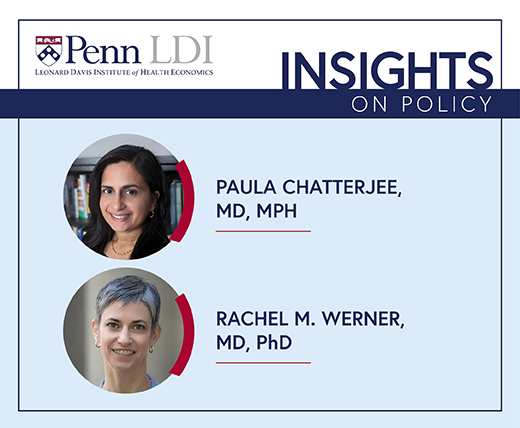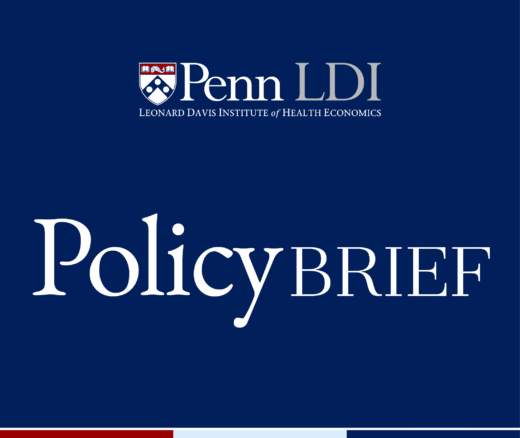
Analysis of the Rural Health Transformation Program
Memo: Response to Request for Analysis
News

Despite broad efforts since 2009 to increase the availability of health insurance and access to health care for underserved populations, low-income people are remaining sicker than higher-income people and that health inequity gap continues to grow. That’s according to José Escarce, MD, PhD, the guest speaker at the April 2 annual Leonard Davis Institute of Health Economics (LDI) Samuel P. Martin III Memorial Lecture.
A Penn alumnus, Escarce’s presentation was based on his study entitled, “Income-Related Inequity in Health Care Delivery: Concept, Measurement, and Recent Trends Among Working-Age Americans.” His Martin Lecture was simultaneously the second-day event in the four-day Penn Medicine Health Equity Week Conference, an annual event designed to facilitate discussions focused on advancing health equity. The LDI lecture was co-hosted by the Penn Division of General Internal Medicine and the National Clinician Scholars Program.
“Disparity in health is increasing dramatically over a really brief period of time,” said Escarce, a Professor of Medicine in the David Geffen School of Medicine at UCLA, a Professor of Health Policy and Management in the UCLA Fielding School of Public Health, and a Senior Natural Scientist at RAND. “Why is this so? Well, the quality of insurance likely matters. Medicaid may fail to provide adequate access to costly services. The spread of Medicaid managed care in particular. Well over 70% or 80% of patients on Medicaid are in Medicaid managed care, a program that is notorious for denying access to expensive things. In fact, a recent Government Accountability Office (GAO) report explained how states have not implemented systems to monitor denials of care by Medicaid managed care organizations, whereas the federal government has done that for Medicare managed care organizations.”

“Additionally, there’s the spread of high deductible health plans, which are slightly more common among low-income people and are fighting against the reduction in health status inequity,” Escarce continued. “Beyond insurance it’s also about the social determinants — not of health but of health care. There are so many sociological barriers to getting health care, and those aren’t going to go away because you get people insurance. It’s also worth noting that the dramatic decline in health among low-income Americans, relative to their more affluent peers, speaks to the multifaceted crises that these Americans face, like in the labor market in earnings and stagnant wages, in health behaviors and other negative factors that are playing out in their health.”
“There’s also the effect of growth in income inequality which can worsen inequity in health care,” said Escarce. “Income inequality has grown in the United States over this period of time and is working against efforts to achieve reductions in health care inequity.”
“Focusing on Medicare expenditures, the 2019 observed concentration index (of our study) would imply that the high-income individuals would get $5,578 per person, and low-income people would get $5,468 per person,” Escarce said. “But if you look at the adjusted index, which is the one that accounts for health status, high-income individuals should get $4,584 per person, and the low-income people should get $6,462 per person. The difference between what they would get in this situation is almost $1,000. So, these small inequity indices translate to huge differences in the amount of care that people actually get.”
The Samuel P. Martin, III, MD Memorial Lecture series honors the legacy of a University of Pennsylvania physician and administrator who believed that American medicine had underachieved in harnessing its vast resources to serve the health care needs of the nation and who devoted his career to addressing the issue of how that could be changed.
Escarce is currently working on several projects that address socio-demographic barriers to access in managed care organizations and is the principal investigator of a program project entitled “Health Care Markets and Vulnerable Populations,” which uses the Medical Expenditure Panel Survey (MEPS) and is funded by the Agency for Healthcare Research and Quality (AHRQ). Among other issues, the program project addresses racial and ethnic differences in access to and quality of medical care.

The previous day’s Penn Medicine Health Equity Week event was a panel moderated by LDI Senior Fellow Jaya Aysola, MD, DTMH, MPH, Assistant Dean of Inclusion and Diversity and Associate Professor of Medicine and of Pediatrics at the Perelman School of Medicine. She is also the Founder and Executive Director of Penn Medicine’s Center for Health Equity Advancement (CHEA). The panelists included Penn Medicine nurses Larissa Morgan, MSN, RN-BC; Rebecca Trotta, PhD, RN; Felicia Morrison, MSN, MBA, RN; and Andrea Blount, MPH, BSN.
The panel marked the first collaboration between the Center for Health Equity Advancement and the Abramson Center for Nursing Excellence.
Entitled “The Path for Women of Color to Ascend in Health Care,” the session was focused on an underway study focused on defining the factors that impede advancement of female nurses of color to executive leadership. Launched in 2020, the pilot study’s goal is to produce recommendations to improve advancement of women of color (WOC), peer-reviewed publications on related themes, and a “playbook” for WOC advancement based on critical insights from the study’s analyses.
Over 53% of the women who held health care CEO roles had a clinical background, and 43.9% of them were nurses. However, Black, Indigenous, and People of Color who make up 23.6% of the nursing workforce account for only 19% of first- and mid-level managers, 14% of hospital board members, and 11% of executive leaders.
“The stats are clear,” said Aysola. “There is a gap that is important to highlight in terms of advancing women of color not only in our nursing workforce but all the way up into executive leadership. Nurses represent the backbone of most of our health care systems and it’s important to honor their voices as we make changes towards advancing equity.”


Memo: Response to Request for Analysis

Lessons from the Past, Imperatives for the Future

A New Study of a Sample of Facilities Found Half Without Any Behavioral Health Staff

Physicians Were Paid About 10% Less for Visits Involving Black and Hispanic Patients, With Pediatric Gaps Reaching 15%, According to a First-of-Its-Kind LDI Analysis

A New Review Finds Hospital Mergers Raise Prices Without Improving Care, and Urges Regulators to Stop Accepting Quality Claims to Justify Consolidations

Technology Helps Older Adults Stay at Home—But May Delay Necessary Transitions to Higher Levels of Care